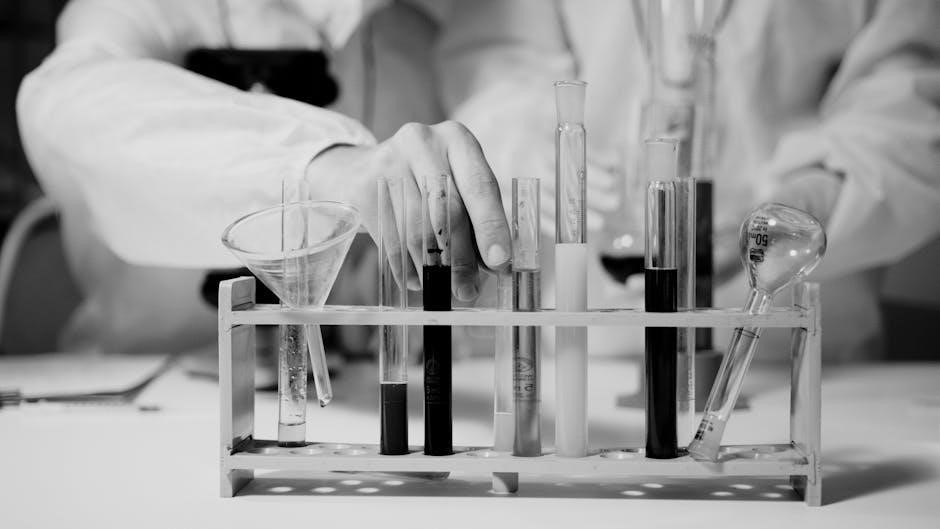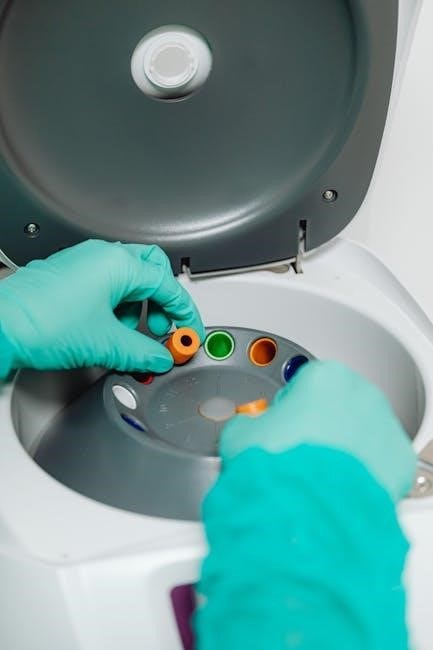Principles of Instrumental Analysis 7th Edition PDF: A Comprehensive Guide
This seventh edition of Principles of Instrumental Analysis remains the standard in the field, offering updated coverage of modern techniques and instrumental methods. It emphasizes clarity and depth, making it an essential resource for students and professionals. The PDF format enhances accessibility and convenience for digital learners.
Overview of the 7th Edition
The 7th edition of Principles of Instrumental Analysis is a thoroughly updated and comprehensive resource that builds on the legacy of previous editions. It incorporates modern advancements in analytical chemistry, with a strong focus on the operating principles of instruments and their applications. The text has been refined to enhance clarity and depth, ensuring it remains accessible to both students and professionals. Key updates include expanded coverage of atomic and molecular spectroscopy, chromatography, and electrochemistry. The integration of digital resources and PDF formats provides flexibility for learners, making it easier to engage with the material. This edition continues to solidify the book’s reputation as a cornerstone in the field of instrumental analysis.
Key Features of the Book
The 7th edition of Principles of Instrumental Analysis is renowned for its comprehensive coverage and clear explanations of complex analytical techniques. It emphasizes the operating principles of instruments and their optimal applications, making it a valuable resource for both students and professionals. The book includes updated chapters on atomic and molecular spectroscopy, chromatography, and electrochemistry, reflecting modern advancements in the field. Additional digital resources and PDF formats enhance accessibility and convenience for learners. With its focus on clarity and practicality, this edition maintains its status as a standard text in instrumental analysis education and practice.
Authors and Their Contributions
Douglas A. Skoog, F. James Holler, and Stanley R. Crouch are the esteemed authors of Principles of Instrumental Analysis. Their collective expertise spans decades, with each contributing significantly to the field. Skoog, a pioneer in analytical chemistry, has been recognized with numerous awards for his work. Holler and Crouch bring extensive experience in instrumentation and chemical education, ensuring the book’s content is both comprehensive and accessible. Their collaborative efforts have made the 7th edition a benchmark in the field, blending theoretical foundations with practical applications. Their contributions have shaped the understanding of instrumental analysis for generations of students and professionals.

Core Principles of Instrumental Analysis
This section covers the fundamental concepts and theories underlying instrumental analysis, emphasizing accuracy, precision, and the interaction of matter with energy, essential for understanding modern analytical techniques.

Instrumental analysis is a fundamental discipline in analytical chemistry, focusing on the detection, identification, and quantification of chemical species; It involves the use of sophisticated instruments to measure physical and chemical properties, providing precise and accurate results. This field is essential in various industries, including pharmaceuticals, environmental monitoring, and food safety. The 7th edition of Principles of Instrumental Analysis introduces students to the core concepts, such as spectroscopy, chromatography, and electrochemistry, with a strong emphasis on the operating principles of modern instruments. Authored by renowned experts Douglas A. Skoog, F; James Holler, and Stanley R. Crouch, the book bridges theory and practice, ensuring a comprehensive understanding of instrumental techniques and their applications.
Basic Concepts and Techniques
Instrumental analysis relies on understanding fundamental principles such as chemical measurements, instrumental design, and data interpretation. Basic techniques include spectroscopy, which measures interactions between matter and electromagnetic radiation, and chromatography, used for separating chemical mixtures. The 7th edition emphasizes the importance of understanding signal-to-noise ratios, calibration, and precision in measurements. It also introduces electrochemical methods, such as potentiometry and voltammetry, essential for analyzing ionic species. These concepts are supported by clear explanations of instrumental operation and practical applications, ensuring a strong foundation for students and professionals. The text provides a logical flow, connecting theory to real-world laboratory practices, making it an invaluable resource for mastering instrumental techniques.

Advanced Topics in Instrumental Analysis
The 7th edition delves into advanced spectroscopic methods, such as Fourier-transform techniques, and explores cutting-edge chromatography and mass spectrometry applications, enhancing analytical precision and versatility in modern chemistry.
Atomic and Molecular Spectroscopy
Atomic and molecular spectroscopy are cornerstone techniques in instrumental analysis, providing insights into molecular and atomic structures. The 7th edition extensively covers absorption, emission, and fluorescence spectroscopy, detailing their principles, applications, and instrumentation. Advances in Fourier-transform spectroscopy and laser-based methods are highlighted, showcasing improvements in sensitivity and resolution. Special attention is given to hyphenated techniques, such as ICP-MS and GC-MS, which combine spectroscopic detection with chromatographic separation for comprehensive analysis. The text also explores theoretical foundations, ensuring a deep understanding of spectrochemical methods. These chapters are enriched with illustrative examples and problem-solving exercises, making them invaluable for both students and practicing analysts.
Chromatography and Separation Techniques are fundamental in analytical chemistry for separating complex mixtures into distinct components. The 7th edition thoroughly covers gas chromatography (GC), liquid chromatography (LC), and high-performance liquid chromatography (HPLC), detailing their operating principles and applications. These techniques are essential in industries like pharmaceuticals, environmental monitoring, and food safety for both qualitative and quantitative analysis. The book provides comprehensive explanations, practical examples, and modern advancements in chromatographic methods, enhancing understanding and practical application.

Applications of Instrumental Analysis
Instrumental analysis is widely applied in pharmaceuticals, environmental monitoring, food safety, and forensic science. Advanced techniques ensure accurate detection and quantification, enhancing quality control and safety standards.
Electrochemistry and Electroanalytical Methods
Electrochemistry plays a vital role in instrumental analysis, enabling the study of chemical reactions involving electron transfer. The 7th edition provides detailed insights into electroanalytical methods, including potentiometry and
Mass Spectrometry and Its Applications
Mass spectrometry is a powerful analytical technique that identifies and quantifies molecules based on their mass-to-charge ratio. The 7th edition thoroughly covers its principles, instrumentation, and applications. It explains ionization methods, mass analyzers, and detection systems, providing a solid foundation for understanding this critical tool. Applications span pharmaceuticals, biomedicine, environmental monitoring, and forensic science. The text highlights advancements in sensitivity, accuracy, and speed, making it an indispensable resource for both students and professionals. By detailing real-world uses, the book bridges theory and practice, ensuring readers grasp the significance of mass spectrometry in modern analytical chemistry.

Digital Resources and the PDF Edition
The PDF edition offers enhanced accessibility, enabling easy access to content anytime, anywhere. Digital resources include interactive features and supplementary materials for enriched learning experiences.
Benefits of the PDF Format
The PDF format of Principles of Instrumental Analysis 7th Edition offers unparalleled convenience and accessibility. It allows users to access the textbook from any device, making it ideal for on-the-go learning. The PDF version is fully searchable, enabling quick navigation to specific topics or concepts. Additionally, it eliminates the need for physical storage, reducing clutter and environmental impact. The digital format also facilitates easy sharing and collaboration among students and professionals. Enhanced readability and zoom functionality ensure that complex diagrams and equations are clear. Furthermore, the PDF edition is cost-effective compared to traditional textbooks. These features make the 7th Edition PDF a practical and efficient choice for anyone studying or working in analytical chemistry;
Additional Resources and Supplements
To complement the 7th Edition PDF, numerous supplementary materials are available, enhancing the learning experience. These include downloadable PDF files that provide background information and engage students through interactive content. The textbook is accompanied by a range of digital tools, such as online quizzes and practice problems, designed to reinforce key concepts. Instructors can access a comprehensive instructor’s manual and presentation slides, making lesson planning more efficient. Additionally, lab manuals and case studies offer hands-on opportunities to apply theoretical knowledge. These resources ensure a well-rounded understanding of instrumental analysis, catering to both students and educators. The supplements are seamlessly integrated with the PDF edition, creating a cohesive and comprehensive learning package.
The 7th Edition of Principles of Instrumental Analysis sets a new standard, influencing future practices in analytical chemistry. Emerging trends like advanced spectroscopy and miniaturized instruments will shape the field.

Impact of the 7th Edition on Analytical Chemistry
The 7th Edition of Principles of Instrumental Analysis has significantly influenced analytical chemistry by providing a comprehensive update on modern techniques and methodologies. Its emphasis on the operating principles of instruments and their applications has enhanced education and research in the field. The book’s clear explanations and updated content, including advances in atomic and molecular spectroscopy, have made it an indispensable resource for students and professionals. The PDF edition has further expanded its reach, enabling easy access to its wealth of information. By bridging theory and practice, this edition continues to shape the future of analytical chemistry, ensuring it remains a cornerstone in the discipline.
Emerging Trends in Instrumental Analysis
Instrumental analysis is evolving rapidly, with emerging trends focusing on miniaturization and portability of devices, enabling field-based measurements. Advances in hyphenated techniques, which combine multiple analytical methods, are improving sensitivity and selectivity. The integration of artificial intelligence and machine learning in data analysis is revolutionizing how complex datasets are interpreted, enhancing accuracy and speed. Additionally, there is a growing emphasis on green chemistry practices, promoting the development of eco-friendly instruments with reduced chemical and energy consumption. These trends, highlighted in the 7th Edition of Principles of Instrumental Analysis, underscore the field’s commitment to innovation and sustainability, shaping the future of analytical science.
